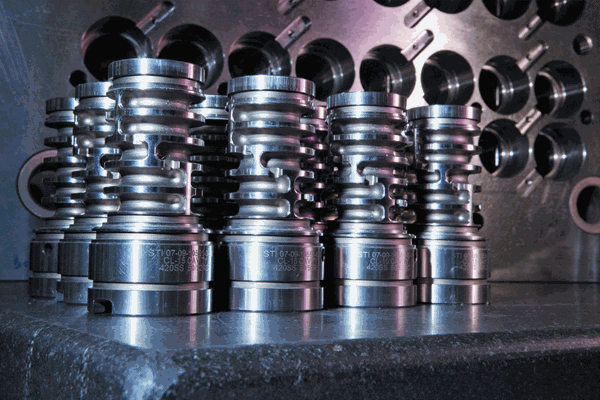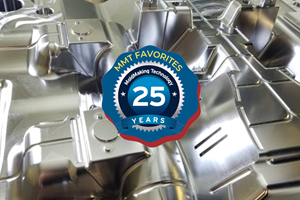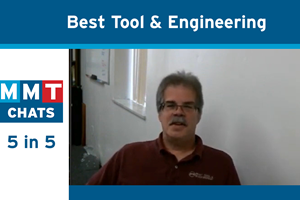Savings from the Front Lines: Rebuilding Saves Molders Money
This quarterly series features actual examples of a front-line mold building company presenting new approaches to improve the customer's profitability.
When the molders for a major medicine bottle manufacturer and a shampoo bottle top manufacturer were not reaching their production, quality or cycle time requirements for the molds, the company turned to Superior Tooling Inc. (Wake Forest, NC)—a manufacturer of plastic injection molds, blow molds, compression and die cast tooling, jigs and fixtures, stamping dies, and precision machine work for the medical packaging, aerospace, electrical, telecom, automotive, housewares and appliances markets.
According to Superior Tooling President Robbie Earnhardt, the 20-employee company prides itself on delivering tooling built to extremely close tolerances for high-quality plastic parts with very low cycle times. “We have been rebuilding tooling for the medical and packaging industries for years,” Earnhardt explains. “Most of these tools are worn, thus causing problems, and not running at full cavitation. Often the molder no longer has the original drawings or documentation for the molds, so we reverse engineer the molds to get this information. This is much more difficult than building a new mold. You don’t have the original information you need, the tool is already built and you have to obtain all of the information to match it back to the original dimensions. If you build a new tool you are designing it and giving it new dimensions and you know exactly what to do.”
The company first got into reverse engineering work through its mold repair jobs. “The more mold repair we did, the more knowledgeable we became about gathering and obtaining information,” Earnhardt notes. “Then we learned about—and starting doing—CMM measurement, which led us into doing reverse engineering.” The company has its own Reverse Engineering department, which is a division of its Engineering Department.
The Process
The molder of the shampoo lids contacted Superior Tooling to reverse engineer and rebuild the mold with its CMM equipment. “We create new models of the mold and a solid model from which we work to rebuild the tools,” Earnhardt elaborates. “Once that process is complete, we are able to give them up-to-date information and documentation on that tool. It is a fresh start for them.”
Superior Tooling kicks off this process with a customer meeting to look at the tool. “Then we bring it into the shop, disassemble it and look at the problems so we can get a better idea of what we are up against,” Earnhardt explains. “Then we quote it. Once that is done, we have continuous conversations with the customer (usually weekly) to update them where the tool is, what we have found, what we need to do, and different options we have to complete the job.”
Often Superior will review the mold, begin the reverse engineering process and start making some components while the customer is still running the mold. “Then we will bring the mold back in and fit the new components to it before doing the remaining work,” he states. “That cuts down their downtime.”
This job took about four weeks, Earnhardt adds. “Over the past year and a half we have rebuilt three very expensive tools for this customer,” he says. “These three molds would have probably cost approximately $750,000 to replace. By rebuilding, rather than replacing, these tools we have probably saved the customer about $500,000—maybe even more if you take out the extended costs of engineering, sampling and other processes that would have been required for a completely new tool.”
Earnhardt plans on Superior Tooling continuing to save its customers money with this reverse engineering niche. “This is a good spot for us,” he concludes. “It has allowed us to remain profitable when the industry was in a downturn.”
Related Content
Exploring ISO 9000 - Part 16 Control of Quality Records
A Series of International Standards for Quality Management and Quality Assurance. We begin 2022 with a review of Clause 4.16 Control of Quality Records.
Read MoreMaking Quick and Easy Kaizen Work for Your Shop
Within each person is unlimited creative potential to improve shop operations.
Read MoreLeading Mold Manufacturers Share Best Practices for Improving Efficiency
Precise Tooling Solutions, X-Cell Tool and Mold, M&M Tool and Mold, Ameritech Die & Mold, and Cavalier Tool & Manufacturing, sit down for a fast-paced Q&A focused on strategies for improving efficiencies across their operations.
Read MoreMMT Chats: 5 in 5 with Best Tool and Engineering
MoldMaking Technology Editorial Director Christina Fuges reveals 5 best practices for improving efficiencies within shops...in 5 minutes. Our guest is Joe Cherluck, President of Best Tool and Engineering in Clinton Township, Michigan. This episode is brought to you by ISCAR.
Read MoreRead Next
Are You a Moldmaker Considering 3D Printing? Consider the 3D Printing Workshop at NPE2024
Presentations will cover 3D printing for mold tooling, material innovation, product development, bridge production and full-scale, high-volume additive manufacturing.
Read MoreReasons to Use Fiber Lasers for Mold Cleaning
Fiber lasers offer a simplicity, speed, control and portability, minimizing mold cleaning risks.
Read MoreHow to Use Continuing Education to Remain Competitive in Moldmaking
Continued training helps moldmakers make tooling decisions and properly use the latest cutting tool to efficiently machine high-quality molds.
Read More









.jpg;maxWidth=300;quality=90)


_300x250 1.png;maxWidth=300;quality=90)












